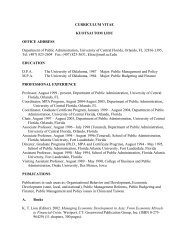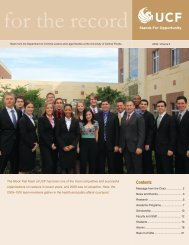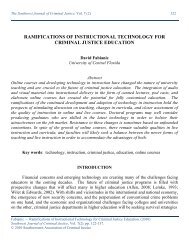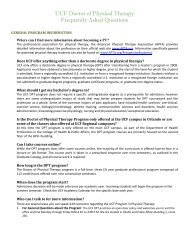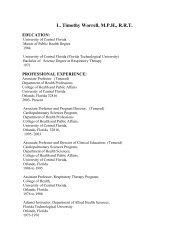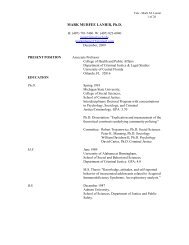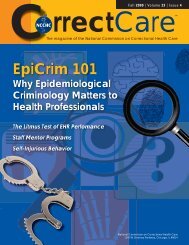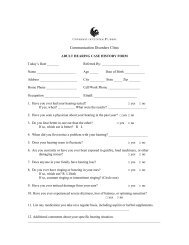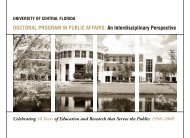<strong>Excellence</strong> in ResearchThe School <strong>of</strong> Nursing excelled in researchduring the past year, with external fundingnearing $3 million. Three faculty members(Emma “E.J.” Brown, Karen Dow <strong>and</strong>Karen Dennis) are currently principalinvestiga<strong>to</strong>rs for National Institutes <strong>of</strong><strong>Health</strong> R01 research projects.1 2Emma “E. J.” Brown, Ph.D., RN, CSFor the past 10 years, Associate Pr<strong>of</strong>essorE.J. Brown has conducted qualitative druguse<strong>and</strong> quantitative HIV-related studies inboth rural <strong>and</strong> urban minority populations.Her current work includes a three-year studyfunded by the National Institute on Drug Abuse,“An Ethnography: Drug Use Among African-American Women in Rural North Florida”(RO1DA013162-02). Her study is exp<strong>and</strong>ingour underst<strong>and</strong>ing <strong>of</strong> the culture <strong>of</strong> southern,rural African-American women who use crackcocaine. She has published her Þndings in twoscholarly papers (see <strong>Public</strong>ations) <strong>and</strong> a thirdpaper is under way.Brown recently convened four focus groups <strong>of</strong>African-American men <strong>and</strong> women, ages 18 <strong>to</strong>39, who were cocaine users <strong>and</strong> residents <strong>of</strong>a rural county or small city in North CentralFlorida. The groups discussed effectivestrategies <strong>to</strong> s<strong>to</strong>p drug use among individuals,including themselves. Their discussionsranged from structural concerns, such asthe need for a job, transportation, shelter<strong>and</strong> culturally sensitive drug treatment <strong>and</strong>interventions, <strong>to</strong> social concerns, such asthe need for social support from family,friends, church <strong>and</strong> the community. They alsosuggested that incentives <strong>to</strong> participate inintervention <strong>and</strong> treatment programs might beeffective. Brown has submitted a manuscript forpublication on this study.Brown’s colleagues value her work withminority, underserved populations. University1<strong>of</strong> South Florida Pr<strong>of</strong>essor Doris Campbellnoted, “Dr. Brown’s research <strong>and</strong> scholarlyexpertise is perfectly in line with a vision <strong>of</strong>the emerging dem<strong>and</strong> for knowledge <strong>and</strong>evidence-based practice with populationscommonly underrepresented in research<strong>and</strong> underserved in practice.”In the future, Brown plans <strong>to</strong> conduct anintervention study aimed at decreasing therates <strong>of</strong> some sexually transmitted diseases(STDs); increasing knowledge <strong>of</strong> STDs,including HIV; <strong>and</strong> assessing attitudes<strong>to</strong>ward high-risk behavior. She also plansan explora<strong>to</strong>ry study <strong>of</strong> new approaches <strong>to</strong>managing drug treatment.Karen Dow, Ph.D., RN, FAAN 2Pr<strong>of</strong>essor Karen Dow is the principalinvestiga<strong>to</strong>r <strong>of</strong> a study, “Quality <strong>of</strong> LifeIntervention in Breast Cancer Survivors,”funded by the National Institute <strong>of</strong> NursingResearch <strong>and</strong> National Cancer Institute(RO1NR05332). She is currently evaluatingthe effectiveness <strong>of</strong> a breast cancer educationintervention program in improving the quality<strong>of</strong> life <strong>of</strong> breast-cancer survivors. The studyis now in its third year <strong>and</strong> includes 150women thus far.Dow says feedback from the participantshas been overwhelmingly positive.Many appreciate the one-on-one instruction<strong>and</strong> un-rushed opportunity <strong>to</strong> discusstreatment-related symp<strong>to</strong>ms <strong>and</strong> concernswith the study’s research nurses. They alsoappreciate the informational overview in theprogram’s educational binder. Several havecommented they did not realize that symp<strong>to</strong>msfrom treatment, such as fatigue, could be longterm.They are reassured <strong>to</strong> learn that they arein fact fatigued, not “lazy” or “unmotivated.”Areas <strong>of</strong> high interest for additional teaching<strong>and</strong> support are lymphedema management,menopausal symp<strong>to</strong>m discussion <strong>and</strong> fear <strong>of</strong>recurrence. Fatigue continues <strong>to</strong> be a concern,despite the fact that subjects have receivedgood information during treatment. Dow ispleased with the study’s low rate <strong>of</strong> attrition,which is about 1 percent. She attributes this <strong>to</strong>the “tremendous support <strong>of</strong> the M.D. AndersonCancer Center Orl<strong>and</strong>o staff, their highly skilled<strong>and</strong> trained research nurses <strong>and</strong> the greatinterest in our study in the CentralFlorida area.”Karen Dennis, Ph.D., RN, FAAN 3In 2003, Pr<strong>of</strong>essor Karen Dennis was awardeda Þ ve-year, $2 million grant from the NationalInstitute <strong>of</strong> Nursing Research <strong>to</strong> study “Homevs. Center-Based Weight Loss <strong>and</strong> Exercise inMenopause” (R01NR0773801A2). It is thelargest single grant awarded <strong>to</strong> date in the<strong>College</strong> <strong>of</strong> <strong>Health</strong> <strong>and</strong> <strong>Public</strong> <strong>Affairs</strong>.4
Research Grants July 1, 2002 - June 30, 2003Dennis’ new study builds on her earlierNational Institutes <strong>of</strong> <strong>Health</strong>–funded project,“Self EfÞ cacy, Metabolism <strong>and</strong> Weight Loss inOlder Women.” Her new study will compare theeffect <strong>of</strong> two weight-loss <strong>and</strong> walking programs,one home-based <strong>and</strong> another center-based, onweight loss, body composition, cardiovascularrisk fac<strong>to</strong>rs <strong>and</strong> psychosocial fac<strong>to</strong>rs.The program’s participants — 100 women whoare overweight or obese, postmenopausal <strong>and</strong>65 years old or younger — will be r<strong>and</strong>omlyassigned <strong>to</strong> either the home-based or centerbasedprogram. Baseline data will be collectedfor each woman before the program, at the end<strong>of</strong> the six-month program <strong>and</strong> again after a sixmonthmaintenance period.“With its health-promotion emphasis, nursingis an ideal discipline <strong>to</strong> conduct <strong>and</strong> translateresearch-based, lifestyle-modiÞ cation weightlossinterventions in<strong>to</strong> practice,” says Dennis.“Weight-loss interventions that postmenopausalwomen will accept <strong>and</strong> incorporate in<strong>to</strong> theirlifestyles are essential for promoting health<strong>and</strong> preventing disease during this period <strong>of</strong>major vulnerability.”“With its health-promotion emphasis,nursing is an ideal discipline <strong>to</strong>conduct <strong>and</strong> translate research-based,lifestyle-modification weight-lossinterventions in<strong>to</strong> practice.”3E.J. Brown, Ph.D.An Ethnography: Drug Use Among African-AmericanWomen in Rural North Florida, $886,000 (multi-year).National Institute on Drug Abuse.Summer Minority Student Research Training, $33,540.National Institute on Drug Abuse.Valerie Brown-Krimsley, Ed.D.Distant Site Expansion <strong>of</strong> UCF Generic B.S.N. NursingProgram, $750,000 (multi-year).Department <strong>of</strong> <strong>Health</strong> <strong>and</strong> Human Services, Bureau <strong>of</strong><strong>Health</strong> Pr<strong>of</strong>essions <strong>and</strong> <strong>Health</strong> Resources <strong>and</strong> ServicesAdministration.Project Lif<strong>to</strong>ff: Community-Based <strong>Health</strong>y Start Services,$142,000. <strong>Health</strong>y Start Coalition.Jacqueline Byers, Ph.D.Graduate Leadership <strong>and</strong> Education ProgramExpansion, $726,413 (multi-year). Department <strong>of</strong><strong>Health</strong> <strong>and</strong> Human Services, <strong>Health</strong> Resources <strong>and</strong>Services Administration <strong>and</strong> Advanced EducationNursing Program.Maureen Covelli, Ph.D.The Relationship <strong>of</strong> Blood Pressure <strong>and</strong>Cortisol Levels <strong>to</strong> Family His<strong>to</strong>ry <strong>of</strong> Hypertension <strong>and</strong>Low Birth Weight <strong>of</strong> African-American Adolescents,$7,500. UCF OfÞce <strong>of</strong> Sponsored Research.Janice Peterson, Ph.D.Nursing Role in Advocating for Patients’ Wishes at End<strong>of</strong> Life, $7,046. UCF OfÞce <strong>of</strong> Sponsored Research.Karen Dennis, Ph.D.Home vs. Center-Based Weight Loss <strong>and</strong> Exercisein Menopause, $2,027,916 (multi-year). Departmen<strong>to</strong>f <strong>Health</strong> <strong>and</strong> Human Services, Bureau <strong>of</strong> <strong>Health</strong>Pr<strong>of</strong>essions <strong>and</strong> <strong>Health</strong> Resources <strong>and</strong> ServicesAdministration.Co-investiga<strong>to</strong>rs: Diane Wink, Ed.D.; TedAngelopoulos, Ph.D.; Stacey Dunn, Ph.D.; YingZhang, Ph.D.; <strong>and</strong> Kristi Silver, M.D.Linda Hennig, Ed.D.Exp<strong>and</strong>ing the Web-Based RN <strong>to</strong> B.S.N. Program <strong>to</strong>Rural <strong>and</strong> Outreach Sites Across Florida, Review <strong>of</strong>All Courses for Cultural <strong>and</strong> Rural Content, $499,000(multi-year). Department <strong>of</strong> <strong>Health</strong> <strong>and</strong> HumanServices, Bureau <strong>of</strong> <strong>Health</strong> Pr<strong>of</strong>essions <strong>and</strong> <strong>Health</strong>Resources <strong>and</strong> Services Administration.Ermalynn Kiehl, Ph.D.AHEC: Community-Based Nursing Initiative, $15,000.Central Florida Area <strong>Health</strong> Education Center (AHEC).Karen Dow, Ph.D.Quality <strong>of</strong> Life Intervention for Women with BreastCancer, $1.6 million (multi-year). Department <strong>of</strong><strong>Health</strong> <strong>and</strong> Human Services, Bureau <strong>of</strong> <strong>Health</strong>Pr<strong>of</strong>essions <strong>and</strong> <strong>Health</strong> Resources <strong>and</strong>Services Administration.Fertility After Breast Cancer, $250,000. Susan G.Komen Breast Cancer Foundation.WebONE: Oncology Nursing Education Project,$60,000 (multi-year). Bris<strong>to</strong>l-Myers Squibb OncologyEducation Grant.Global <strong>Health</strong> Security Network, $6,872. Applied<strong>Health</strong> Science, Inc.Jean Kijek, Ph.D.Pr<strong>of</strong>essional Nursing Traineeship, $61,453.Department <strong>of</strong> <strong>Health</strong> <strong>and</strong> Human Services, Bureau<strong>of</strong> <strong>Health</strong> Pr<strong>of</strong>essions <strong>and</strong> <strong>Health</strong> Resources <strong>and</strong>Services Administration.The Winter Park <strong>Health</strong>Foundation in Winter Park, Fla.,contributed funds <strong>to</strong> support thefollowing research projects:Project: Evaluation <strong>of</strong> CoordinatedYouth Initiative ProgramsPrincipal investiga<strong>to</strong>r: Ana Leon, Ph.D.Co-principal investiga<strong>to</strong>rs:Jacqueline Byers, Ph.D.;Ermalynn Kiehl, Ph.D.;<strong>and</strong> Xiohou Wang, Ph.D.Amount: $266,568 (multi-year)Project: Intergenerational Physical ActivityPrincipal <strong>and</strong> co-principal investiga<strong>to</strong>rs:Karen Dennis, Ph.D.;Elizabeth Rash, M.S.N.;Susan Rogers, M.S.N.;<strong>and</strong> Karen Saenz, Ph.D.Amount: $2,500Project: Community Home AsthmaManagement Program (CHAMP)Principal investiga<strong>to</strong>r: Susan Rogers, M.S.N.Amount: $2,5005
- Page 1 and 2: UCF Nursing -Access to ExcellenceNe
- Page 3: News Highlights 2002 - 2003Doctoral
- Page 7 and 8: School Initiates AcceleratedSecond
- Page 9 and 10: Academic ProgramsDegree ProgramsBas
- Page 11 and 12: 123Visiting Associate Professor Jud
- Page 13 and 14: King, C., Hinds, P., Dow, K.H.,Schu
- Page 15 and 16: 2002 - 2003Sandra Roberts, M.S.N.,
- Page 17 and 18: Alumni1981 - 20021981Rosemary Georg
- Page 19 and 20: Linda Johnson Neely, B.S.N., is an
- Page 21 and 22: Donations to the University of Cent
- Page 23 and 24: For comments, questions ormore info



